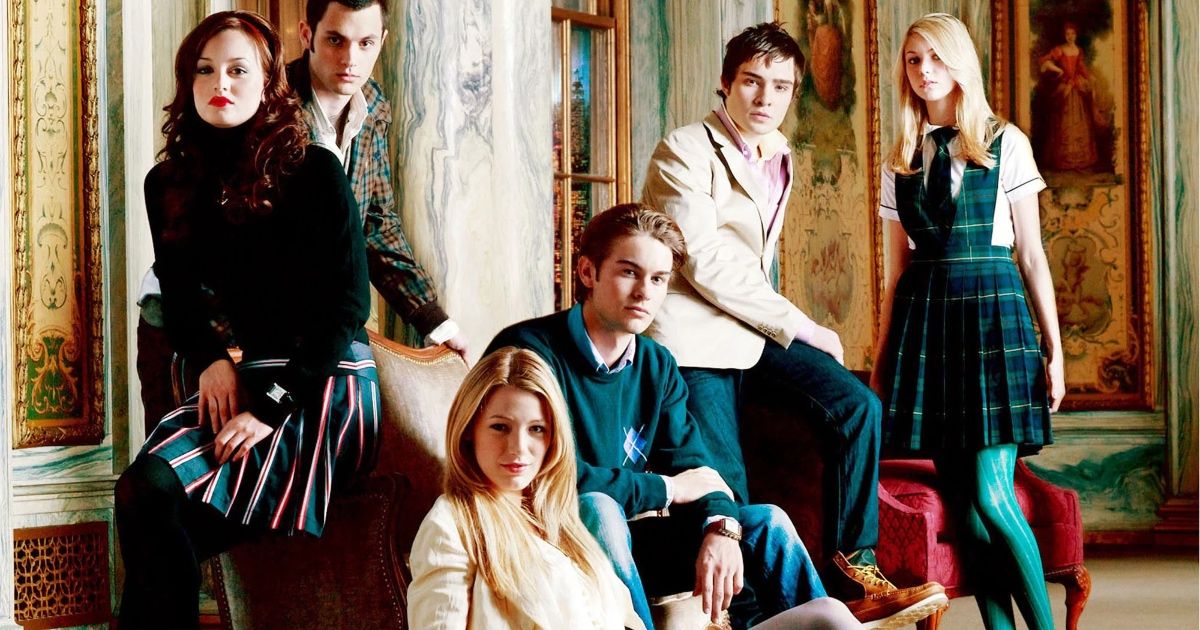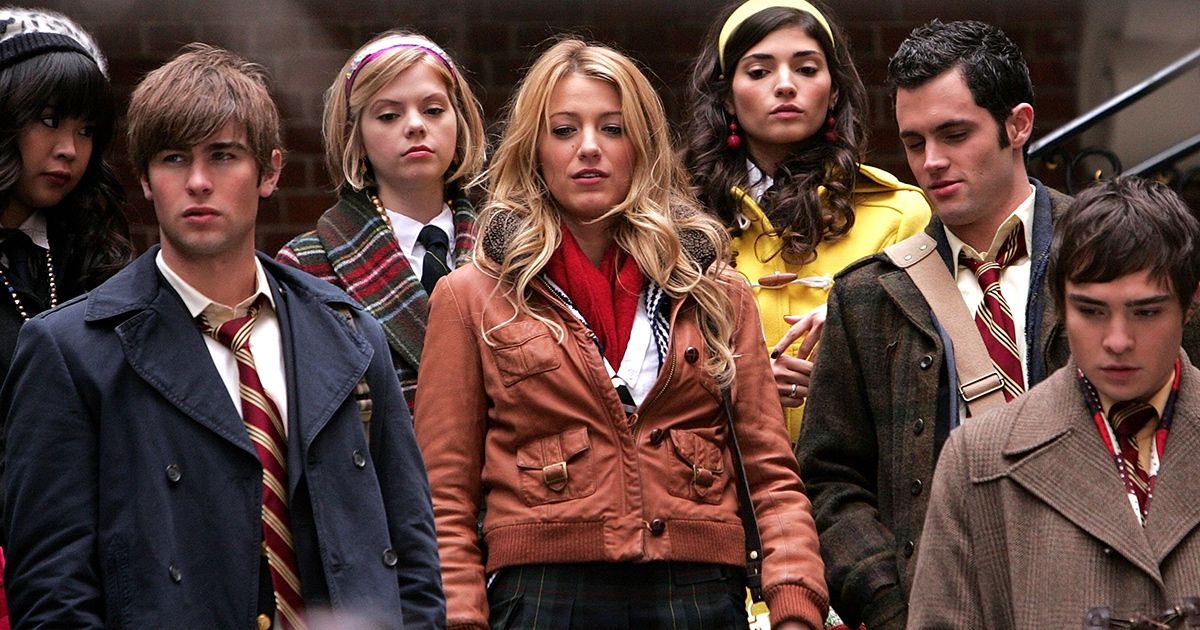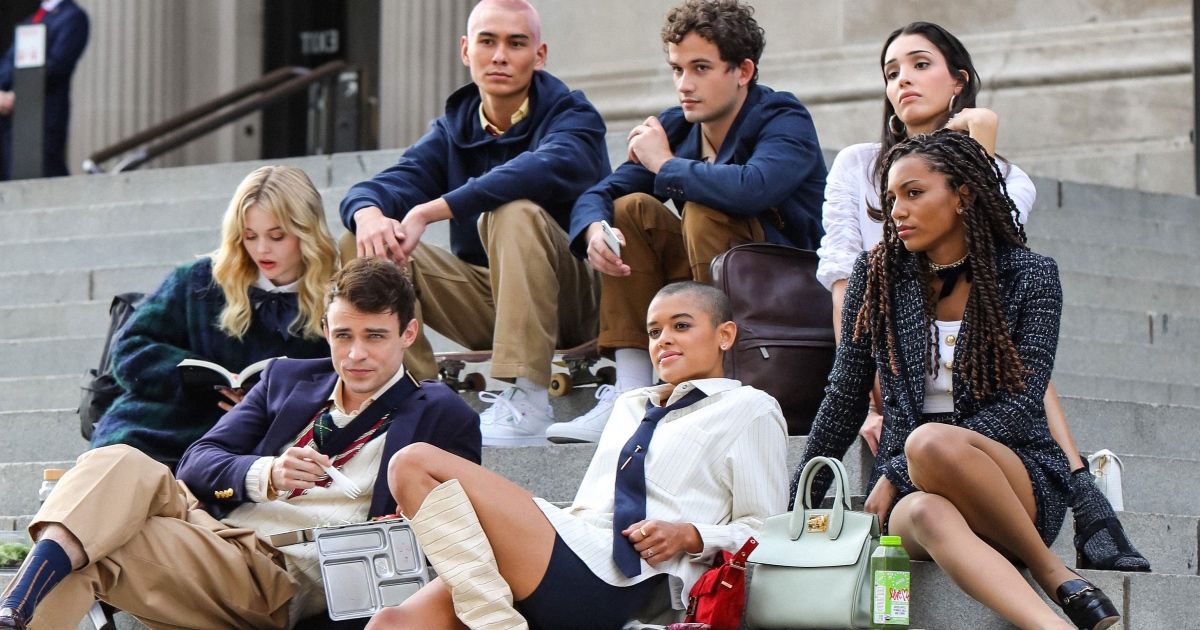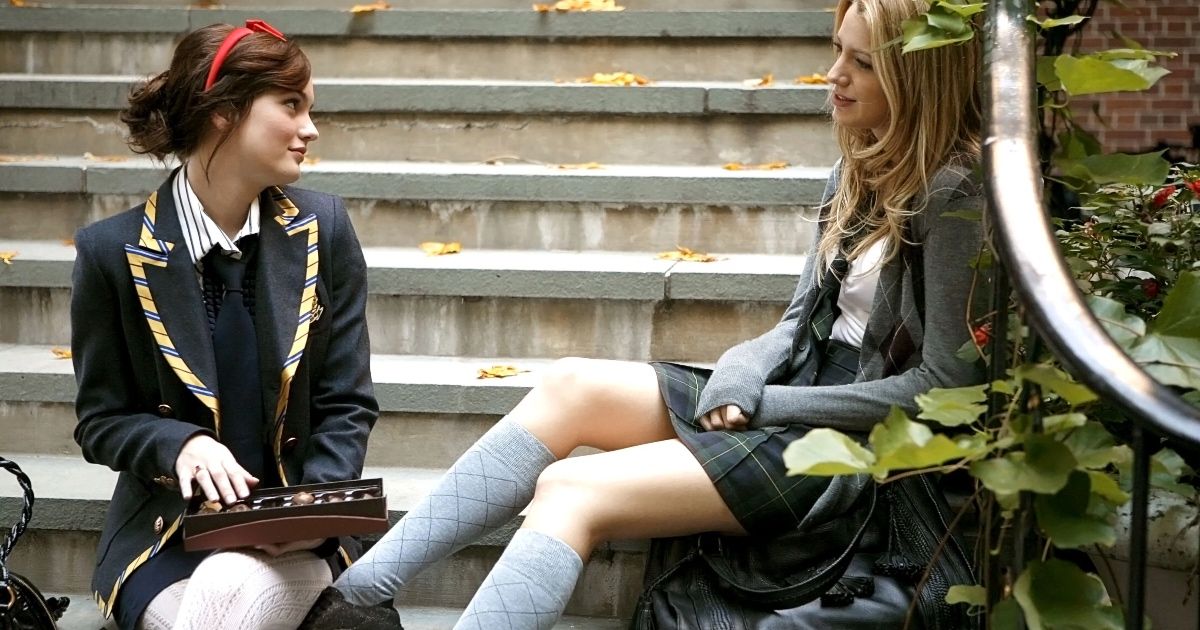When Gossip Girl aired in 2007, it defined an era. “The most awesomely awesome show ever” and “the greatest teen drama of all time,” according to Vulture, left a profound cultural impression on both television and reality. Gossip Girl indulged its own brand of messy, pushing the boundaries of what could happen in a TV drama and inspiring, for good or bad (probably more of the latter), a whole wave of teenage shows with overly explicit sex scenes, general sexualization, underage drinking, and dubiously unhealthy ships, for the likes of Euphoria, Elite, or Riverdale.
A generation of girls wore headbands and colorful stockings because they have seen it on Blair Waldorf, steps of the Met have become a Mecca of adolescent fashion pilgrimage, and gazillion local anonymous blogs popped up to rehash rumors in an emulative sassy tone.
In 2021, Gossip Girl saw rebirth as one of the most popular series on HBO Max. Serving both as a direct sequel and a soft reboot, this version follows a new group of over-privileged, spoiled, and decadent heirs and heiresses of seemingly incessant fortunes. Did the Gossip Girl remake manage to live up to the delectably preposterous escapism of the original?
The Plot of Gossip Girl From Satire to Woke
The original Gossip Girl is, at its core, a satire. This borderline campy teen series is pretty self-aware, discarding all semblance of realistic grounding in favor of nonsensically dramatic, absolutely absurdist extents. Jenny, a junior, skips school to intern at Waldorf Designs — until Eleanor Waldorf steals her dress, and Jenny elopes with a coked-up model to start her brand. Bart Bass faked his death because his company was crumbling and then reappeared after a couple of years to wrestle back the company from his son, even if it meant killing him. Chuck Bass tried to sell the love of his life for a hotel. Blair banished Jenny from the entire island of Manhattan.
The old Gossip Girl was a show about white privilege that was so consumed with itself that it left no room for moralizing. It was a fantasy so detached from reality that even the ‘poor’ Humphreys could live in a spacious loft in Brooklyn and anarchistic Vanessa Abrams could wear Versace.
The reboot is consumed with privilege too, but in a non-fun, preachy way. While the idea of exploring a Black cultural authority is amazing, the realization of it, unfortunately, falls short and appears self-consciously, performatively ‘woke,’ though the range of references to real-life Black and Afro-indigenous cultural authorities is exhilarating. As Vanity Fair, however, explains, “though the new Gossip Girl succeeds in depicting the kind of privilege that takes us from protest to Net-A-Porter all in one day, it stops short of truly engaging with the accompanying concepts of power and elitism. And maybe that’s why it doesn’t feel ‘fun.’”
To add to it, a group of white teachers ‘sacrificing’ an American-Indian woman has a rather tacky implication. A white boy making out with a Black girl with police chasing protesters as a backdrop, can seem insensitive.
The Gossip Girl Herself
The remake's biggest problem, though, is its treatment of the actual figure of the eponymous Gossip Girl. Voiced by the incredible Kristen Bell, the Gossip Girl is not and should not be a character, but rather a plot device. A collective image, she is a cheeky teenage version of Big Brother, all-seeing and all-knowing. Who really sits behind the laptop is a mystery no one is actually interested in solving. This is why the plot twist (Dan being the Gossip Girl) made the ending of the original series one of the most hated series finales of all time.
It is all the more baffling, why the reboot decided to take a thing universally accepted as unsuccessful (this misstep is even referenced in other shows, for instance, in a clever Emily in Paris scene) and make it one of the major plot lines. Teachers being the Gossip Girl opens a whole new can of worms. First, their reasoning does not stand against any criticism. Apparently, Gossip Girl is supposed to make Constance Billard students into better people and make them study harder… by bullying them and distracting them from their classes? Not to mention that these adults are literally stalking children, taking indecent photos of them, and putting out their sexual life for the whole world to see? No wonder lots of viewers were grossed out.
Characters
What the remake has over the original, is, of course, its diversity. The focus of the new Gossip Girl is on the two Black girls, their story, and their connection. Julien and Zoya’s relationship on screen has the potential to become an emblematic story about sisterhood, especially because there is space for exploration of racial identities in different class spaces, in interracial relationships, and growing up with a white parent compared to growing up with a Black parent…
The reboot also thrills with its nonchalance about non-heterosexuality. Monet being a lesbian or Max’s pansexuality is not sensationalized; it is simply there, its deliberate mundanity inspired by new queer cinema. Their sexuality is not their entire personality. One of the creators who happens to write for both the original and the reboot, Joshua Safran said in the interview: “Even in my early 30s, in the first Gossip Girl writers’ room, I was still writing features that were straight. I was writing my queer relationships inside straight relationships. I hadn’t yet broken that barrier of being like, ‘No, you can actually write about [the queer relationship by itself].’”
Regrettably, the 2021 version of Gossip Girl does not utilize these characters to their full potential. Compared to the cast of the original, the new characters lack charisma and chemistry. Most of the time, they do not even resemble friends. Even though the original drama introduced characters right during the follow out, the viewers could sense that they have a long history, and they have a deep connection.
Blair is manipulative and bossy, but she is that way because of her severe inferiority and abandonment issues. Although her issues do not absolve her, they give her character depth. Serena is an airhead because her whole life nobody was interested in what was going on in that pretty head of hers. She constantly fights against people’s preconceived perceptions of her. On the other hand, Monet and Luna are just mean girls. Julien goes from one extreme to another, but we do not understand her struggle.
Be it due to poor writing or lack of direction, or perhaps bad acting, ultimately only Max stands on his own and even overshines his inspiration and predecessor, Chuck Bass. Max Wolfe manages to be everything the creators wanted Chuck to be, sans the problematic connotations of being a villain pushed to be a romantic hero without a proper redemption arc, a phenomenon beautifully described by Vox. Max is suave but vulnerable, sharp-tongued but sensitive.
Fashion
Just like Sex and the City in the late 1990s, the original Gossip Girl proved to be the 2010s fashion authority. Gossip Girl could single-handedly make an item or a trend popular or rocket-launch it into obscurity. Designers lined up for a chance to feature their clothes on Serena or Blair. Tory Burch commented in 2008 that showcasing her items on the show immediately translated to sales. Girls brought pictures with Blake Lively and Leighton Meester (from the show and everyday life) to shops.
Daman, the costume designer, said in his interview with Fashionista: “Once we got one bigger designer to say yes, it's like letting the flood gates open, and early on, Chanel said yes. All of a sudden, everybody wanted to be a part of it”. Daman also made the preppy style popular with men, making ascots and pink jackets highly sought-after items, at the same time beguiling men to stop wearing belts altogether.
Part of what helped Gossip Girl become the It-show is styling being used as a part of storytelling. Each character had their own, easily distinguishable, style. Tests and quizzes such as “Are you more like Serena or Blair?” have not lost their relevance to this day.
Gossip Girl from 2021 certainly showcases beautiful clothes; however, it just cannot achieve the momentum of its predecessor. Fashion, in general, is much more accessible now, and the remake relies on existing fashion trends, which means the looks become dated by the time viewers see them on screen. Given the filming angles and lighting, there is an impression that the reboot is no longer a show about fashion but a show about fashionable people. Most of the scenes are poorly lit, and viewers are rarely given full shots of the outfits, contrary to the original.
All in all, the Gossip Girl remake has its moments and surely will win some fans. It is not a situation of ‘it’s so bad it’s kinda good,’ though, due to creepy, spiteful, and totally unredeemable adults who spy on children; failing to develop its interesting premises; countless plot holes, and uninspired storytelling. The new iteration of Gossip Girl is not necessarily bad. Far worse, it is boring and forgettable.





